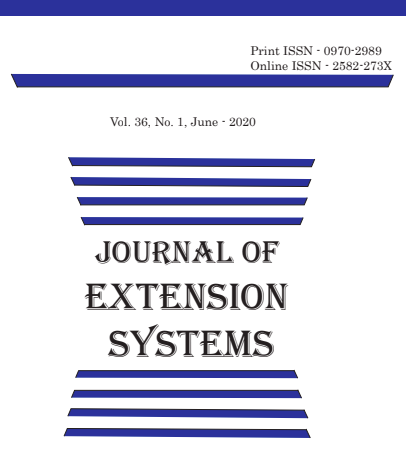Enhancing Wheat Productivity, Profitability, Nutrient Use Efficiency, and Carbon yield through Foliar Application of Zinc Sulphate in Western India
DOI:
https://doi.org/10.48165/jes.2025.41.1.5Keywords:
Carbon yield, Efficiencies, Zinc application, WheatAbstract
This study was carried at farmer’s fields to evaluate the recommended technology enhanced the yield, return, input use and carbon yield of wheat during winter season of season 2022-23 in the Sri Ganganagar district of Rajasthan. In this region, wheat growers were mainly applied nitrogen and phosphorous based fertilizer, while the Zinc (Zn) deficiency was also reported in soil. So, we demonstrated 100% recommended dose of fertilizer (RDF) i.e. 120 N: 40 P kg/ha+ foliar application of Zn sulphate @ 6.0 kg/ha at 40 DAS at randomly selected farmer’s field and compared with farmers practices field under wheat crop. The average of examined data revealed that the wheat yield was enhanced under demonstrated fields as compared to farmers’ practices. Similarly, net realization was also recorded higher under demonstrated fields. The efficiency of applied fertilizer use, production and economics were also recorded superior with 100% recommended dose of fertilizer (RDF) i.e. 120 N: 40 P kg/ha+ foliar application of Zn sulphate @ 6.0 kg/ha at 40 DAS than farmer practices. The grain and straw yield were improved with application of balance fertilizer treated field as compared to farmer practice. This study concluded that the application of balance fertilizer not only improved the productivity but also enhanced the efficacy of critical input by the wheat crop.
Downloads
References
Anwar, S., Khalilzadeh, R., Khan, S., Nisa, Z., Bashir, R., Pirzad, A., & Malik, A. (2021). Mitigation of drought stress and yield improvement in wheat by zinc foliar spray relates to enhanced water use efficiency and zinc contents. International Journal of Plant Production, 15, 377–389. https://doi.org/10.1007/s42106-021-00136-6
Arough, Y. K., Sharifi, R. S., Sedghi, M., & Barmaki, M. (2016). Effect of zinc and bio fertilizers on antioxidant enzymes activity, chlorophyll content, soluble sugars and proline in triticale under salinity condition. Notulae Botanicae Horti Agrobotanici Cluj-Napoca, 44(1), 116–124.
Bhat, F. A., Ganai, B. A., & Uqab, B. (2017). Carbonic anhydrase: Mechanism, structure and importance in higher plants. Asian Journal of Plant Science Research, 7(3), 17–23.
Cakmak, I. (2008). Enrichment of cereal grains with zinc: Agronomic or genetic biofortification? Plant and Soil, 302, 1–17. https://doi.org/10.1007/s11104-007-9466-3
Cakmak, I. (2011). Zinc plays critical role in plant growth. Available online: http://www.zinc.org/crops/resourceserve/zinc_plays_critical_role_in_plant_growth (accessed on 17 April 2011).
Dass, A., Rajanna, G. A., Babu, S., Lal, S. K., Choudhary, A. K., Singh, R., Rathore, S. S., Kaur, R., Dhar, S., Singh, T., Raj, R., Shekhawat, K., Singh, C., & Kumar, B. (2022). Foliar application of macro- and micronutrients improves the productivity, economic returns, and resource-use efficiency of soybean in a semiarid climate. Sustainability, 14(10), 5825. https://doi.org/10.3390/su14105825
GOI. (2023). Report on minimum support prices 2023. Directorate of Economics and Statistics, Department of Agriculture, Cooperation & Farmers Welfare, Ministry of Agriculture and Farmers Welfare, Government of India (GOI). https://desagri.gov.in/wp-content/uploads/2023/10/English.pdf
Grote, U., Fasse, A., Nguyen, T. T., & Erenstein, O. (2021). Food security and the dynamics of wheat and maize value chains in Africa and Asia. Frontiers in Sustainable Food Systems, 4, 617009. https://doi.org/10.3389/fsufs.2020.617009
Hussain, S., Maqsood, M. A., & Rahmatullah. (2011). Zinc release characteristics from calcareous soils using di-ethylene tri-aminepentaacetic acid and other organic acids. Communications in Soil Science and Plant Analysis, 42, 1870–1881.
Janmohammadi, M., Amanzadeh, T., Sabaghnia, N., & Dashti, S. (2016). Impact of foliar application of nano micronutrient fertilizers and titanium dioxide nanoparticles on the growth and yield components of barley under supplemental irrigation. Acta Agriculturae Slovenica, 107, 265–276. https://doi.org/10.14720/aas.2016.107.2.01
Kumari, P., Sharma, P. K., Kumari, R., & Singh, U. P. (2021). Effect of tillage and crop establishment practices on performance of rice (Oryza sativa) under rice-wheat cropping system. Annals of Plant and Soil Research, 23(2), 170–174. https://doi.org/10.47815/apsr.2021.10051
Ma, D., Sun, D., Wang, C., Ding, H., Qin, H., Hou, J., Huang, X., Xie, Y., & Guo, T. (2017). Physiological responses and yield of wheat plants in zinc-mediated alleviation of drought stress. Frontiers in Plant Science, 8, 1–12. https://doi.org/10.3389/fpls.2017.00860
Ramzan, Y., Hafeez, M. B., Khan, S., Nadeem, M., Batool, S., & Ahmad, J. (2020). Biofortification with zinc and iron improves the grain quality and yield of wheat crop. International Journal of Plant Production, 14, 501–510. https://doi.org/10.1007/s42106-020-00100-w
Reshma, Z., & Meena, K. (2021). Foliar application of biosynthesised zinc nanoparticles as a strategy for ferti-fortification by improving yield, zinc content and zinc use efficiency in amaranth. Heliyon, 8(10), e10912. https://doi.org/10.1016/j.heliyon.2022.e10912
Saini, S. P., Singh, P., & Brar, B. S. (2019). Nutrient management improves productivity and economic returns by increasing nutrient use efficiency in floodplain soils under maize-wheat cropping system. Indian Journal of Agricultural Sciences, 89(10), 1589–1593.
Sharma, B., Vyas, K. G., Sharma, S. K., Kumari, R., Meena, C. P., Singh, B., & Sharma, P. (2023). Performance of Indian mustard as influenced by plant growth regulator brassinosteroid under the Western Arid Region of Rajasthan. Journal of Oilseed Brassica, 14(2), 154–158.
Singh, A., & Singh Shivay, Y. (2015). Zinc application and green manuring enhances growth and yield in basmati rice (Oryza sativa L.). Indian Journal of Plant Physiology, 20(3), 1–8. https://doi.org/10.1007/s40502-015-0167-2
Singh, P., Benbi, D. K., & Verma, G. (2021). Nutrient management impacts on nutrient use efficiency and energy, carbon, and net ecosystem economic budget of a rice–wheat cropping system in Northwestern India. Journal of Soil Science and Plant Nutrition, 21, 559–577. https://doi.org/10.1007/s42729-020-00383-y
Zhao, A., Tian, X., Cao, Y., Lu, X., & Liu, T. (2014). Comparison of soil and foliar zinc application for enhancing grain zinc content of wheat when grown on potentially zinc-deficient calcareous soils. Journal of the Science of Food and Agriculture, 94, 2016–2022.
Qamari, P., Shekari, F., Afsahi, K., Tavakoli, A., Samimifard, R., Shekari, K., & Mastinu, A. (2023). Response of wheat cultivars to zinc application for seed yield and quality improvement. The Journal of Agricultural Science, 161, 549–562. https://doi.org/10.1017/S0021859623000473
Published
Issue
Section
License
Copyright (c) 2025 Journal of Extension Systems

This work is licensed under a Creative Commons Attribution-NonCommercial-NoDerivatives 4.0 International License.

